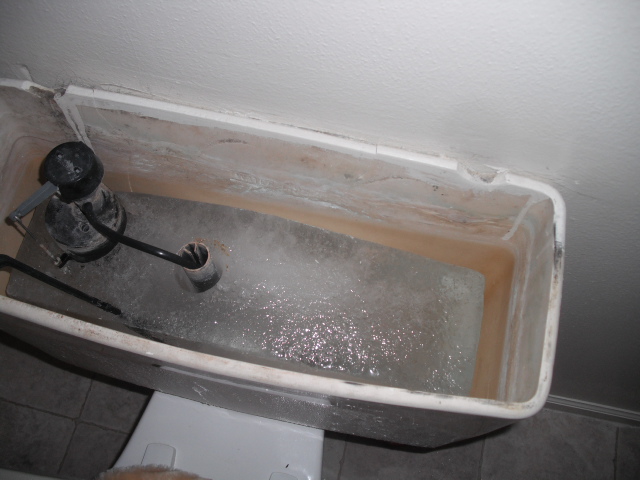Keep Your Water Lines from Freezing!
Yesterday morning, I had the first hard frost of the season on my truck which means it's time again to talk about how to keep your water lines from freezing.
Hose Bibs
I have a comment that is embedded in my report that I use all winter:
In winter weather, it is a good idea to remove hoses from the bibs to prevent damage from freezing.
It is such a common item that we don't even notice it. The hose is still attached to the bib - more often than not, it seems, the hose bib is a frost-free. People like frost-free bibs for good reason - having a pipe freeze and break inside a wall is a major pain. The problem is that a frost-free valve doesn't work if the hose is attached and has water in it.
The frost-free valves work by having the actual shutoff inside the mechanism inside the wall, not at the handle on the outside of the home like the old 1950's style faucets. When you turn the valve off, the remaining water drains from the spigot so that it can't freeze. A hose prevents the draining. If the water is in the line and freezes, it expands and your pipe can rupture.
Make sure you remove any splitters or quick releases - these present the same problems. Also, make sure you don't have a slow leak as the water drips can freeze up the opening acting as a cap.
I recommend putting on covers to the hose bibs for a bit of extra protection. Will the inspector remove it - probably not, in my experience.
Many older homes that lack frost-free valves have shut-offs inside the house. If yours does, use it and then open the valve on the outside. I recommend covers on all non-frost-free valves.
Interior Plumbing
If you are living in the home while it is on the market, most of this is not going to be an issue for you but if you've already moved and the house is vacant but you want the water on, I want to remind you to do a couple of things that will keep the plumbing in safe conditions.
First, leave the heat on. It doesn't have to feel like the Bahamas inside, but you should keep the thermostat set to 55 degrees or higher. Leave all the cabinet doors open below the sinks to allow heat to get to the pipes. If you are not going to leave the heat on at all, you have to fully winterize the home. I will talk about winterization in another post next week . . .
Second, make a decision on whether you want to turn the water off to the home. If you turn it off, crack open the valves and drain the system as best you can. Leave a couple of the faucets open to allow the pressures to stabilize.
If you leave it on, ask your Realtor to check in on your property at least weekly. Some inspectors will also perform this service, so ask around. What you want from them is a visual inspection of the plumbing. In bitterly cold conditions, these visits should be done daily. It may cost a bit on money but I can promise you that the expense is less than that of spraying water and a flooded house.
In extreme conditions, the hot and cold water should be left on a trickle. As anyone who has paid attention to a river realizes, moving water is less likely to freeze.
Plumbing pipes at exterior walls, in unheated basements, and the crawlspace are most in danger. You may need additional heat or a heat tape in these locations. Any plumbing that is in unheated spaces should be insulated but, by the time you move out, it's probably too late unless you want to spend the extra money for your buyer. You should know that Washington State Standards of Practice mandate that we identify these in the report though we are required to recommend upgrading - for now, at least.
Don't forget the fixtures - and the water heater!
The toilet reservoir holds up to three gallons of water. Having that water turn into a block of ice - or worse, having the water heater freeze - can be disastrous . The picture to the right is from an inspection I did two winters ago. The seller eventually spent thousands of dollars to make the necessary repairs.
. The picture to the right is from an inspection I did two winters ago. The seller eventually spent thousands of dollars to make the necessary repairs.
If the heat is off, it is imperative that you, at a minimum, drain the toilets. If you turn the water heater off, drain it as well.
And, for what it is worth, the agent had recommended a full winterization. It was excellent advice and would have saved this seller a goodly chunk of cash.
It would have also kept the buyer from freaking out - and to be clear, this inspector is not a big fan of plumbing problems. They often end up more complex than first realized and always seem to involve a combination of multiple trips to the hardware store, bad language, and a good plumber.
A good agent is worth his or her weight in gold - please listen to them if they say you should winterize to keep your water lines from freezing. And follow the other steps above even if you are occupying the home. Especially those pesky hose bibs.